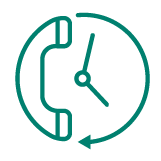How smart spending is the secret to financial wellness
Knowledge is power. When you know how, when, and where you spend your money, even just small tweaks have the potential to transform your finances.
Canadians on average spend $96.40 of every $100 we earn, according to Statistics Canada. Bills and cost of living expenses eat up large chunks of that money for many people. Then there's our debt and the cost of repaying it. Canadians owe $176 for every $100 of disposable (after tax) income.
Being smarter with your spending can help you reduce your debt and increase your savings, while still paying the bills and maintaining a lifestyle you want.
Why good spending habits matter
Uncontrolled spending means grabbing that extra item at the checkout that's not on your list. Or ordering takeout when your fridge is full. Or impulse-buying that new ski jacket online—in the middle of summer. It can also mean the habitual spending that adds up over time, like the daily coffee at your favourite spot.
Left unchecked, this type of spending can lead to over-spending—spending more than you can afford—and an increase in debt, especially if you use credit cards to finance spending. Some small changes to your spending habits can pull you out of this vicious cycle.
The first step is to know what bad spending habits look like—so you can give them the heave-ho.
"It should be possible to track and control your spending, and still enjoy treats, have meals out, and buy things you want."
6 bad spending habits to be aware of
The following bad spending habits can all contribute to eating up much more of your income than you might think.
1. Daily cup of coffee
A cup of coffee, often with a snack, has become a routine rather than a treat for many people. That daily cup of joe adds up over time.
2. Eating out too much
We get it. Buying lunch and dinner out or getting takeout is much easier than making homemade meals. However, all these meals out can put a significant dent in your finances, not to mention leading to food—and money—waste at home.
3. Late credit card payments
Late credit card payments often incur a fee. It may not seem like much, but it's money that could be better used elsewhere—especially if it becomes a habit.
4. Buying brand name groceries
Brands spend millions to convince people that only something with their logo on it will do. When it comes to your weekly food shop, there's really no difference between the big brand and the store brand—apart from the price.
5. Impulse buying online
The ease of online shopping makes it hard to resist. Online retailers know exactly which buttons to push to persuade people to click "Buy Now."
6. Throwing money away
You may not think you're throwing money away, but do you know for sure? What about that gym membership? Or that on-demand TV subscription? Or the mobile phone plan you thought you needed? It's amazing what you could be spending on things you don't need, use, or even want anymore.
Taken individually, the above habits might add up to just a few dollars a day each month. Taken together over time, that can really add up. If you overspend by $200 every paycheque cycle for two years, that’s almost $10,000.
7 ways to spend smarter
It should be possible to track and control your spending, and still enjoy treats, have meals out, and buy things you want
1. Know where your money goes
Look back over your spending and categorize where your money has gone, for example on gas, home repairs, and eating out. You can see it all in your online banking. Then sit down and go through it with a fine-tooth comb to build a picture of exactly where your money goes. One way to make this easier is by downloading all your categorized chequing account and credit card transactions into a spreadsheet.
2. Create a budget
Once you know how you spend, you can plan to spend more wisely. A simple budget can help you keep your spending in check and focus on priorities, such as saving or paying down debt. Your budget should be part of an overall financial plan, that includes your financial goals and how you can achieve them.
3. Identify quick wins
Look for easy places to reduce spending. This includes cancelling subscriptions you don't use, making credit card payments on time to avoid late fees, and reducing your daily coffee and other treats to every two days.
4. Set up multiple accounts
Consider having a chequing account exclusively for your regular outgoings, such as subscriptions, fees, and bills. That way you know these are all covered and you can track them in one place. Set up another account, with no overdraft, as a "spending" account. Transfer a specific amount each month into this account for non-essential spending.
5. Remember to save
It's important to also think about your longer-term financial goals. Separate savings accounts can help you "pay yourself first" each month to save for financial goals.
6. Set up recurring payments
Set up recurring payments to your chequing and savings accounts. Also, set up regular payments to your credit card or line of credit to chip away at your debt and avoid those late fees.
7. Limit credit card use
Focusing on reducing your debt is one of the best ways to improve your finances. Set smaller limits for your credit card so it's harder to make those impulse purchases online.
While it can take a little time to change your spending habits, you'll be glad you made the effort when you see how quickly it can help you reduce debt and save more.
What's next?
Contact us to discuss your financial wellness, including how to spend smarter. We've got your back.
Other articles you may be interested in:
We are always here to help
These articles are made available to you as tools for independent use and are not intended to provide investment advice. We cannot and do not guarantee their applicability or accuracy. All examples are hypothetical and are for illustrative purposes only. Please visit your branch to seek personalized advice from qualified professionals for all personal finance issues.








